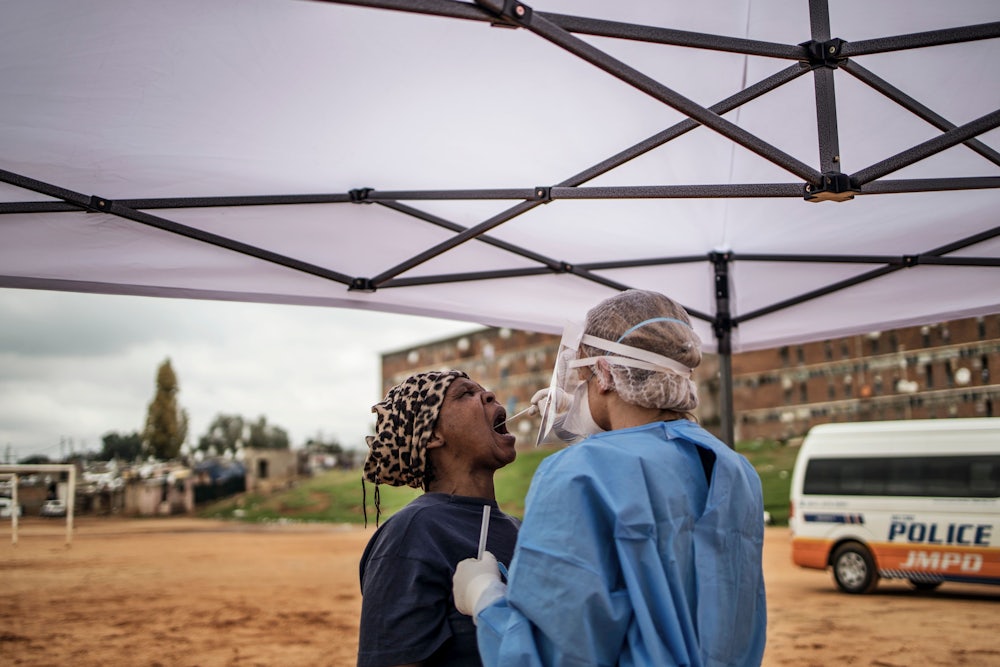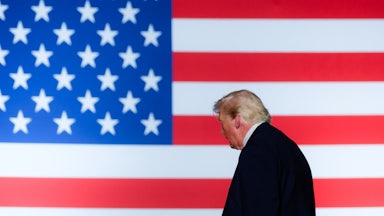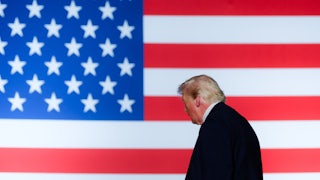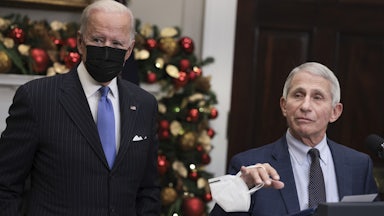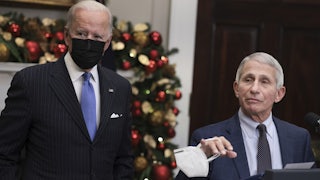As the world learned of the omicron variant of the coronavirus last week, Western leaders responded in predictably counterproductive ways, banning flights to the region of Africa where the variant was first discovered—but too late to stop it from spreading around the world. It remains to be seen whether omicron is so dangerous that it will cause disease and deaths to spike and send us back to an earlier stage of the pandemic. But even if omicron isn’t the worst-case scenario, the worst-case scenario will come sooner or later, and fighting it will require international cooperation on a scale we haven’t yet witnessed. Instead, we’re seeing more of the same panic responses that characterized earlier Covid-19 waves.
As a result of the travel bans, scientists leading the sequencing initiatives in South Africa are now running out of the very supplies they need to track the new variant—and to report to the world exactly how worrisome it may be. Tulio de Oliveira, director of South Africa’s Centre for Epidemic Response and Innovation, tweeted on Monday that supplies like reagents, which scientists use to conduct tests, are running low. Without these tests, it will be impossible to know how quickly the virus can spread.
“It feels quite cold and miserable here,” Linda-Gail Bekker, director of the Desmond Tutu HIV Center and chief operating officer of the Desmond Tutu Health Foundation in South Africa, told me. She was “really shocked and worried” to hear the news of vital scientific supply shortages. “Resources are critical,” she said. “When things close down, we’re cut off. We may as well be on another planet.”
Instead of travel bans applied unevenly, countries need to support global science—in South Africa and elsewhere—now more than ever. That support includes making vaccine and treatment manufacturing and distribution more equitable, empowering genomic sequencing and surveillance around the globe, and communicating openly as global leaders and leading experts.
These actions are particularly important as the virus continues to evolve and new variants emerge. As the United States faces a new surge in cases and continues searching to see if omicron is already here, hospitals in many states are already being overwhelmed. Our health is intricately connected to the health of everyone else on the planet, particularly at this unstable time, and helping other countries improve their capabilities will help keep Americans safe as well.
The African continent has some of the world’s lowest rates of vaccination, in large part because of poor access and because richer countries hoarded more doses than they needed. Yet countries like South Africa provided invaluable knowledge, through clinical trials, of how well the vaccines work, and some African countries even manufactured doses that were then sent elsewhere, including to Europe.
Allowing these countries to make their own vaccines for local distribution would be key, says Bekker. This would entail sharing patents, transferring technology and the know-how to create the vaccines, and scaling up manufacturing facilities. “Is there a way, again, that Africa can play a role in bringing these terrific innovations closer to home by being able to manufacture them?” Bekker asked.
The same applies to promising treatments like monoclonal antibodies and forthcoming antiviral medications. “Where are the monoclonals? They aren’t ever in Africa,” Bekker said. “You guys benefit from the fruits of the R&D far sooner than we do.”
Scientists in southern Africa and other parts of the global south have long collaborated “brilliantly” with the U.S. and other nations on biomedical advancements, Bekker said. But they frequently see those medications far later than richer countries. “Can we move this relationship further upstream and really talk about a partnership that starts earlier?”
“We’ve shown we can do a lot,” Bekker said, even with limited resources. “Need drives innovation in the most effective way.”
This kind of regional self-sufficiency would also steady the global supply. “What happened in India is also a good example of why that’s important,” Céline Gounder, an infectious disease specialist and epidemiologist at New York University and Bellevue Hospital, told me. When cases shot up, India announced it would stop exporting vaccines in order to address its own emergency—an understandable impulse that nonetheless led other countries to scramble, looking for much-needed vaccines.
There are global issues around vaccine distribution, particularly in rural areas, so investing in the supply chain and in the development of easily transportable and accessible vaccines—for instance, ones that don’t need supercold freezers or that can be given nasally, instead of through an injection—is important. That could also address long-standing issues around vaccine hesitancy, especially in places with distrust of the government and other institutions.
But a major driver of vaccine hesitancy actually comes from the U.S. “We’re one of the biggest exporters of misinformation and disinformation,” Gounder said. “We do need to clean up our own act in terms of regulating some of that, because it’s having an impact not just here but it’s having an impact elsewhere, where they’re less able to police it, where they’re less able to regulate it.”
Part of the reason South Africa is a scientific leader is because of the force of the HIV/AIDS epidemic it has endured. Bekker, who has worked extensively on HIV/AIDS, has seen a lot: parents and children suffering miserable deaths for want of a cure. But the worst part came, paradoxically, when effective medications were developed. “That’s most painful, I think,” Bekker said. “I’ll never get over that—knowing that there was life-saving treatment for HIV in the [global] north, and we were unable” to access it.
There’s yet another lesson to be taken from the HIV/AIDS epidemic, Bekker said: “When you have that kind of punitive approach, what it does is it drives people underground, it drives scientists underground.” Uneven travel bans haven’t just stopped the vital flow of resources to the country; they have effectively punished the very people who sounded the alarm. As Bekker put it: “You find things when you’ve been looking for them, and we’ve been looking.”
“South Africa is one of the leaders in this genomic surveillance space,” Gounder told me. “They are some of the top virologists in the world on this.” She believes that bans founded not on logic but on panic will “have a very chilling effect on science. You know, when people ask, why isn’t China more transparent? This kind of behavior will lead many countries to be less transparent.”
Instead of alienating or isolating other countries, it’s important to keep strong lines of communication open and to share lessons on what does and doesn’t work. “Let’s make sure we track this carefully. Let’s see where we are. Let’s compare notes,” Bekker said. “The enemy is the pathogen. We tend to forget that.”
Scientists in southern Africa are already collaborating together. In fact, the omicron variant was discovered by Botswanan scientists who shared samples from four fully vaccinated diplomats in early November.
The emergence of variants anywhere can be dangerous to all of us everywhere. There is a strong moral mandate to vaccinate the world—but there is also a practical one. “If you have spread anywhere in the world, that puts us in this country at risk,” Gounder said. “The U.S. definitely owes it to its own citizens to control transmission around the world. Because transmission anywhere puts us at risk for emergence of a new variant, which can threaten our pandemic recovery here.”
